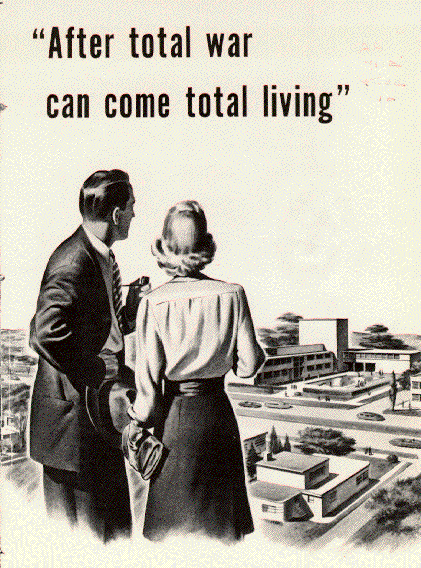> Militarily:
- In overcoming Germany, the US had become the number-one airpower in the world.
- Likewise, the Soviet Union had become the number-one land force in the world.
- The balance of power had shifted away from Britain and France, as they had been unable to defeat Germany and thus were now "second rank" powers.
- Likewise, the Soviet Union had become the number-one land force in the world.
- The balance of power had shifted away from Britain and France, as they had been unable to defeat Germany and thus were now "second rank" powers.
- The Soviet Union was now the strongest military force of all its neighbors (regional powerhouse).
> Economically,
- The US economy was greatly strengthened by the war, and was thus able to outproduce all other nations.
- The US was committed to a free trade economy (increasing market competition).
- Because the US now controlled the economy, it could move to returning both economic and political stability to Europe.
- The Soviet Union was now the strongest economic force of all its neighbors, who needed its support.
> Politically,
- In the eyes of Europe, US democracy had triumphed over German and Italian fascism.
- Likewise, Soviet Communism had triumphed over fascism.
- The USSR's tremendous losses in WWII placed it in an influential democratic position in the post-war conferences.
- The USSR had the political strength to return "order" to Europe. Communism a probable candidate to fill the postwar political vacuum.
2) Eight steps that lead to the Cold War:
2) Eight steps that lead to the Cold War:
8. Three wartime conferences: Tehran (Nov 1943), Yalta (Feb 1945), Potsdam (July 1945)
-Exposed ideological differences of the West powers with the USSR for the post war world, especially through the tensions at Yalta (disputes over Poland's borders and Poland's government)
7. Kennan's Long Telegram (Feb 1946)
-Claimed the Soviet Union was insecure, hostile to the West, forcibly advancing Stalinist policies, and repressive of its people; great influence over Truman and eventually America's people
6. Churchill's 'Iron Curtain' Speech (March 1946)
-Publicly stated the West's distrust of the USSR; sparked immediate, harsh USSR reaction (perceived West as racist)
5. Truman Doctrine (March 1947) & Cominform (Oct 1947)
-US becoming politically involved in Europe (no longer pursuing isolationist policies)
4. Marshall Plan (June 1947)
-The economic reflection of the Truman Doctrine
3. Red Army Occupation of Eastern Europe (1945-1947)
-Impossible to move, as already physically standing on Eastern Europe territories; began forcibly imposing Communist policies
2. Czech Coup (Feb 1948)
-Utilized to push through Marshall Plan; Czech republic felt isolated and so caved to USSR's pressures to become a Communist nation
1. Berlin Blockade (June 1948)
-A failure for the USSR (tried to force West districts out of Berlin, which remained divided)
Ultimately, this lead to the establishment of NATO (April 1949) and the creation of West Germany (Sept 1949) and East Germany (Oct 1949) as separate states.




